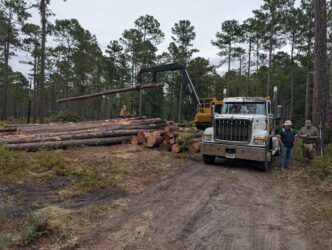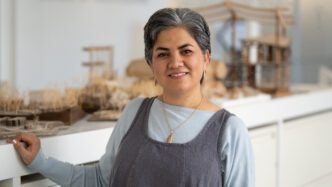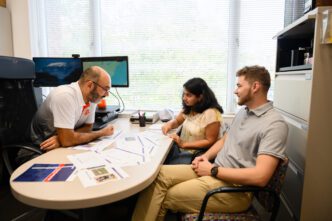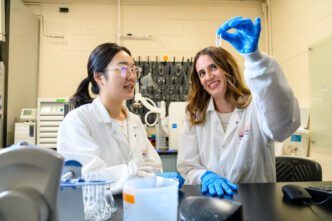With South Carolina’s forestry and forest products industries facing significant headwinds, Clemson University’s Wood Utilization + Design Institute (WU+D) convened industry, government and academic leaders Sept. 24 at the Madren Conference Center to explore new products and markets for the state’s abundant timber.
The meeting took place amid a series of high-profile mill closures, including those of International Paper in Georgetown, the WestRock plant in Charleston, International Paper in Savannah, and the Containerboard Mill in Riceboro, which have reduced market capacity and disrupted the wood supply chain.
“This has been a tough few years for forestry,” said Guy Sabin, vice president of the Forestry Association of South Carolina. “It seems like in the past few years we’ve had decades of change. There have been changes in manufacturing, changes in demand. In fact, we’ve probably lost somewhere in the ballpark of 10 million tons of wood from our wood markets and productive capacity. It affects our entire wood supply chain.”
South Carolina State Forester Scott Phillips said the losses impact all 46 counties.
“The loss of a paper mill is catastrophic, especially when you look at southern silviculture and how we grow trees in the South,” Phillips said. “Losing the markets for small-diameter wood is devastating. Those paper mills are very high-paying jobs. In Georgetown, it was a loss of 750 jobs. The economic impact of that mill was right at $1 billion. And then you have the impacts on the individual landowners and the entire forestry supply chain.”
Renewed mission
WU+D was launched in 2013 to support the state’s forestry industry by increasing the use of wood in sustainable and resilient building construction through cross-disciplinary collaboration among Clemson experts in forestry, architecture and construction science.
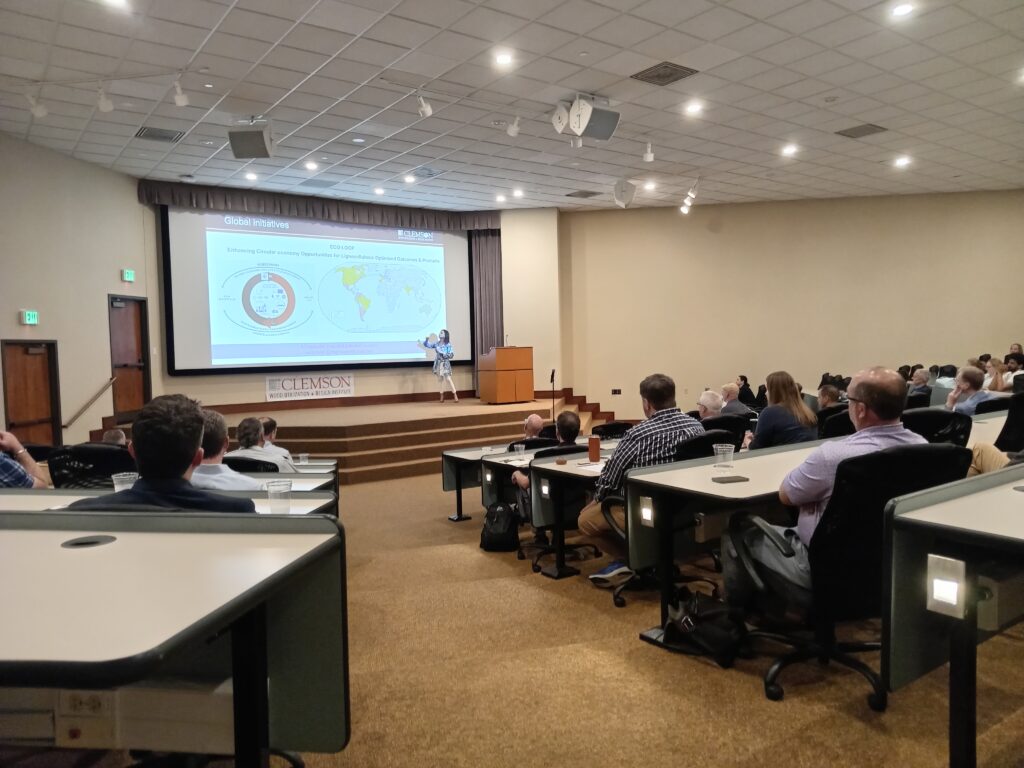
Since then, the institute has forged public-private partnerships, secured grants, designed and tested innovative wood-based building materials such as cross-laminated timber, and educated builders and architects nationwide on the environmental and construction benefits of wood.
At the open house, institute leaders highlighted a refreshed mission to drive innovation in wood and renewable bio-based materials through research, design and industry collaboration—aiming to make South Carolina “the Finland of the Southeast” in sustainable timber, bio-based products and circular economy systems.
WU+D expands its strategic priorities
M. Soledad Peresin, who was named to WU+D’s Patricia “Pat” Layton Endowed Directorship in July 2025, described her role as the convergence of her passions for sustainable innovation, interdisciplinary collaboration and industry engagement. She outlined strategic priorities for WU+D that include:
- Driving research and innovation in wood-based materials such as high-performance polymers, hybrid composites, coatings and adhesives
- Building strategic partnerships across academia, government and industry to accelerate innovation and commercialization
- Expanding stakeholder engagement and growing the institute’s endowment to support research, infrastructure and outreach
- Investing in workforce development and experiential learning through hands-on student training and interdisciplinary collaboration
- Promoting a sustainable and inclusive bioeconomy by integrating life-cycle thinking into every facet of the institute’s work
“WU+D is uniquely positioned at the intersection of research, material design and real-world application, an ecosystem I have thrived in throughout my career,” Peresin said. “With Clemson’s tremendous breadth of expertise, WU+D can build functional, market-ready solutions while cultivating the next generation of scientists and engineers. By marrying materials innovation, supply-chain development and education, WU+D can reconnect South Carolina’s forests to a thriving market, revitalizing rural economies, landowner returns and the state’s broader forestry sector.”
Peresin earned her Licenciate (Masters’) degree in Analytical Chemistry with a focus on Pulp and Paper Engineering from Universidad Nacional del Litoral in Argentina and her Ph.D. in Forest Biomaterials from North Carolina State University. She also spent six years as a senior scientist at VTT, the Technical Research Centre of Finland, where she advanced high-performance fiber-based products and the surface chemistry of lignocellulosic substrates in close collaboration with industry.
Turning challenges into opportunities
The open house showcased how WU+D and its partners hope to transform wood side-streams, which are by-products from pulp mills and sawmills once considered waste, into valuable materials such as lignin-based asphalt binders, advanced wood pulp adjuvants for agriculture, multifunctional bio-based coatings for mass timber and high-performance oriented strand board.
Clemson faculty are also expanding into intelligent packaging, water and air remediation and bio-based crop protection polymers by targeting $4.4 million in federal funding.
The institute is collaborating with USDA, industry and multiple Clemson colleges on affordable housing, sustainable building materials and testing programs. Regional and global initiatives highlighted at the open house include the $160 million NSF Regional Engine “BRIDGES” to make the Southeast a world leader in sustainable biobased manufacturing and ECO-LOOP, an international network enhancing circular economy opportunities for lignocellulosic products in 22 countries.
Looking ahead
State forester Phillips praised WU+D for anticipating industry needs and convening partners to solve them.
“The WU+D Institute has been, from the very beginning, a forward-leaning organization that is very good at defining strategic issues that we’re dealing with in the wood industry and then coalescing partners around those issues to create a path forward,” he said. “Clemson University and WU+D have led the nation in bringing people together to talk about mass timber, and there’s an opportunity for us here at Clemson going forward.”
Peresin called on stakeholders to join her ambitious plan to diversify South Carolina’s forest products industry.
“Clemson is a land-grant institution, and we owe it to our stakeholders to come up with solutions to help our struggling forest products industry,” she said. “I have a plan, and it’s very ambitious, and I need you all to start thinking about how you can play a role in this plan.”

